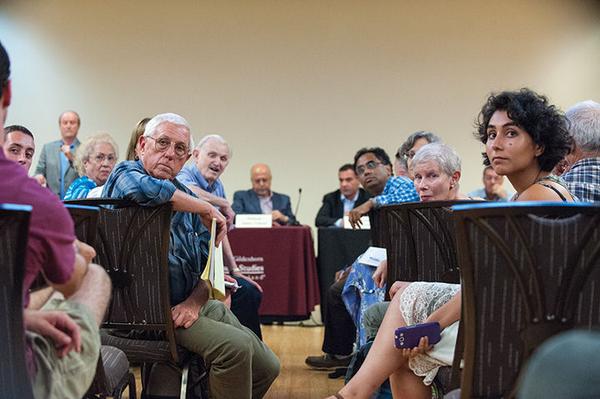The American-Israel Public Affair Committee, a highly influential pro-Israel political advocacy organization, invited presidential candidates to its annual conference in Washington. All of the presidential candidates came, except Bernie Sanders, due to an alleged “scheduling conflict.” As expected, the candidates that spoke at the conference delivered a staunch pro-Israel position thereby, pandering to the influential Israeli lobby. While Sanders did not attend, he delivered a foreign-policy speech in Utah that discussed Israel. Although Sanders’ speech presented a more honest viewpoint on the Israeli-Palestinian conflict, it tended to disproportionately blame Israel. The speeches on the subject of Israel revealed a central problem in the narrative on the Israeli-Palestinian conflict, which solely blames one side while exonerating the other.
AIPAC’s staunch pro-Israel position fails to criticize Israeli policies that further exacerbate tensions between Israelis and Palestinians. They frequently advocate Israel’s right to defend itself, which is true for every nation and is perhaps more true for Israel, a nation that has consistently faced security threats since its independence. However, AIPAC’s narrative continuously disregards or fails to criticize specific Israeli policies that are contributing to tensions between Israelis and Palestinians — for instance, the continued expansion of settlements in the West Bank, in which Israelis move into homes previously occupied by Palestinians. The settlements “completely ignore the interests of the Palestinian inhabitants and the implications for their ability to sustain a future state, as well as Israel’s own long-term interests and its ability to maintain the stability of a future border,” columnist Shaul Arieli wrote in Haaretz.
The pro-Palestinian position delivers a false and misleading narrative that tends to solely blame Israel for the conflict without acknowledging problems on the Palestinian side. This narrative fails to acknowledge the existence of Hamas, a terrorist organization whose actions threaten any possibility for peace between Israelis and Palestinians. For instance, Palestine supporters are quick to criticize Israeli military actions but are silent on Hamas firing rockets into Israel, which results in Israeli military responses. Furthermore, a main obstacle to peace is that Hamas and a majority of Palestinians reject Israel’s right to exist or any form of a Jewish state. The tactics utilized by supporters of the Palestinians further the divide, preventing any true meaningful debate on the Israeli-Palestinian conflict.
Pro-Palestinian initiatives like the Boycott, Divestment and Sanctions Movement and associated academic organizations advocate academic boycotts of Israeli higher education institutions as a tactic to demand rights and self-autonomy for Palestinians. In early 2016, Historians Against the War proposed resolutions to the American Historical Association that demanded a boycott of Israeli higher education institutions in order to protect “the right to education in the Occupied Palestinian Territories.” These resolutions alleged that Israel stops students from pursuing education, restricts movement that impedes on access to education, bombs educational institutions and restricts people from giving lectures in the West Bank. Thus, the resolutions demanded that “the AHA commits itself to monitoring Israeli actions restricting the right to education in the Occupied Palestinian Territories.” The Alliance for Academic Freedom, an organization of academics that encourages an open intellectual discussion on the Israeli-Palestinian conflict, opposed these resolutions, because as academics, members “strive to apply rigorous standards to research and analysis rather than to subsume academic discipline to political expediency.” Instead, the AAF “encourages the creation of opportunities for collaboration and exchange that would expose Palestinians and Israelis to each other’s historical narratives and use knowledge and mutual understanding to promote peace.”
If organizations like the BDS Movement are interested in securing Palestinians civil liberties and self-autonomy, they need to change their tactics, because their current strategy is self-defeating. Engaging in boycotts has the potential to further alienate Israeli leadership, as well as organizations that support a two-state solution. Instead, they should collaborate with organizations such as J Street and lobby policymakers that support a two-state solution. While the BDS Movement is quick to criticize AIPAC, it should learn from AIPAC. AIPAC is highly influential in policy debates on the subject of Israel because it is highly organized and is tactful in achieving unwavering American support for Israel.
Leslie McNamara is a public policy graduate student. She can be reached at



